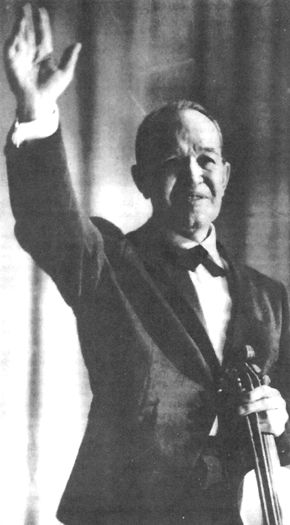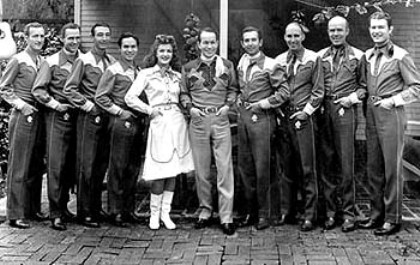Historical Western Swing - Spade Cooley
By
Leocthasme
New Page 1
Historical Western Swing
In the upcoming issues of Pencilstubs, I will try to continue my several
articles on the history of Western Swing. Many,
many, comments have been received directly by me and many more have appeared
below the previous articles I have written since the October Issue of 2000.
There are still comments being made on the original article because it is
referenced any time someone just looks for Western Swing by
typing just those two words into a search engine.
Well, let’s face it, I love the referrals, and now just thinking of
that, I feel I should continue to add all the information I can find on an
interesting subject, from all sources beside all the information I have
accumulated over the years from clippings and the backs of old record covers.
So each month or so I will find and report on some interesting fact,
history, an individual or group who helped make this genre very special in the
history of American Music.
Here is another article, this one on a very interesting group who did so
much for
Western Swing
Keep Posted to This Site!
Leocthasme
Donnell
Clyde ‘Spade’ Cooley:
Born 17
December 1910,
Grand,
Oklahoma, USA
Died
23
November 1969,
a Life Term Prisoner.
For
anyone looking down at his STAR on
Hollywood
’s Walk of Fame, the name Spade Cooley probably doesn’t mean very much.
At one time he was a real life star, known as the ‘King Of Western
Swing” back in the 40s and 50s when he had a 30 piece band and hosted his own
TV variety show. Now his greatest
claim to fame is that he is the only convicted killer with a star on
Hollywood
’s Walk of Fame. On February 8,
1960 the foundation for that star was laid, but just one year later Cooley was
in a prison cell serving a life sentence for the murder of his wife, Ella Mae
Evans. Today, Cooley has yet to
emerge fully from the shadows of musical obscurity.

Cooley
waving to a crowd after a show for a Sheriffs benefit while on temporary parole.
He
had a heart attack and died later in his dressing room.
A
few recordings are being brought back, and Actor Dennis Quaid has purchased the
rights to Cooley’s children’s stories. Filmmaker,
Dave Payne, has been writing his own script for a screen version of Cooley’s
life. A reverence for Cooley’s
musical talent, along with a fascination about his grim downward spiral, seems
to be at the root of renewed interest in his life story.
Cooley was
a musician, an accomplished fiddler, a big band leader,
actor, and television personality. He
also was the self proclaimed ‘King of Western Swing’, an innovator,
who at his peak led the largest band ever assembled in the annals of country
music. The product of a multi-generational family of fiddle players, Donnell
Clyde Cooley was born in
Oklahoma
in 1910, and at the age of four, his family moved to
Oregon
. Despite his impoverished
background, Cooley was a classically trained fiddler and by the time he was
eight years old, he was performing professionally at square dances with his
father, John. In 1930, Cooley (who
received his nickname ‘Spade’ thanks to his poker playing skills) moved to
Los Angeles
, playing with a number of western-oriented acts. By the mid-'30s, he was
working as an actor, with bit parts in several Westerns for Republic Studios, he
served as Roy Rogers' stand-in and also toured with Rogers as a fiddle player,
and handled vocal duties with the Riders of the Purple Sage.
Cooley did not begin a
recording career until 1941, when he entered the studio while a member of Cal
Shrum's band. A year later, he took control of bandleader Jimmy Wakely's group,
the house band at
Santa Monica
’s Venice Pier Ballroom, and their Western Swing style music began attracting
thousands of fans each Saturday night. The densely populated band, home to as
many as three vocalists and fiddlers at a time, featured singer, Tex Williams,
and guitarists Joaquin Murphy and John O. Weis.
In 1945, Spade Cooley &
His Orchestra's first single, "Shame on You," lasted nine weeks atop
Billboard's country charts. The
first in an unbroken string of six Top Ten singles (including "Detour"
and "You Can't Break My Heart"), "Shame on You" would remain
Cooley's theme song for years to come. Also in 1945, he married his second wife,
orchestra backup singer, Ella Mae Evans. Ultimately,
the Orchestra's success led to the dissolution of its most popular lineup; by
1946, Tex Williams, the vocalist on all of the group's hits, was demanding more
money, and Cooley refused to pay it. As
a result Williams quit, taking much of the Orchestra with him to form Tex
Williams’ Western Caravan. In
1947, Cooley began a career in television, hosting a program in
Los Angeles
titled ‘The Hoffman Hayride’. The
show's popularity grew quickly, and within months an estimated 75 percent of all
televisions in the
L.A.
area tuned into the show each Saturday night. He
also resumed his film career, this time with much higher visibility; in addition
to significant roles in a number of Westerns, he also starred in two 1949 short
subjects, ‘King of Western Swing’ and ‘Spade Cooley & His
Orchestra’.
Cooley’s often sordid
private life tended to overshadow his career as an entertainer.
Throughout the early '50s Cooley continued to record, but the group's
popularity waned as public tastes changed; after a time, he even fired the
Orchestra to replace its members with an all-female band. A
heavy drinker, Cooley descended into alcoholism as his career declined, and he
suffered a series of minor heart attacks. Furthermore,
he was facing financial ruin as a result of problems with a planned water theme
park to be located in the
Mojave Desert
. In 1961, his wife Ella Mae left
him. After an argument with her, he
stomped her to death while the couple's 14-year-old daughter, Melody, looked on
in horror. The resulting trial, a
media circus, during which Cooley suffered another heart attack, culminated in a
sentence of life imprisonment. Throughout
his term, he was a model prisoner, and thus was allowed to perform at a
sheriff's benefit in
Oakland
,
CA
, on November 23, 1969. After
playing in front of a crowd of over 3,000, Cooley returned to his dressing room,
suffered yet another heart attack, and died.
Spade Cooley
would often bill himself as the 'King of Western Swing', the title which Bob
Wills is now honored with. However,
Cooley's sound was closer to and isolated in the style of conventional big band
dance-oriented pop orchestras. Whereas 'Bob Wills And His Texas Playboys' used far more diverse fusions of multi-genres through
which they popularized, defined, and evolved what is now recognized as true
Western Swing. This diversity
allowed Wills to reach wider audiences. Cooley's
specialized 'city sound' of the period’s popular culture accounts for his work
having been popular with limited mainstream audiences during his 1940's and heyday, but at the same time not
having enjoyed the diverse and continuing popularity of Wills.
Dennis Quaid, a Texan, with
an equal passion for Western Swing, points to a dual quality in Cooley’s
musical work. “You have this
really upbeat, happy music and then there is darkness in the lyrics, they are
all about mistrust and betrayal.” Cooley’s
best known song, ‘Shame On You’ (also the working title of Quaid’s film),
has lyrics like, ‘took my car and my money, I tell you gal that ain’t
funny’, and ‘ran around with other guys and tried to lie when I got wise’.
Cooley murdered his wife because he mistrusted her and claimed she was
cheating on him. To Cooley’s fans
and friends such lyrics have a particular haunting quality.
I hope Quaid and Payne can
come out with a historical film that could put a good light on Spade Cooley’s
‘big band’ style of Western Swing.

Spade Cooley, Ella Mae
and band.
Click on author's byline for bio and list of other works published by Pencil Stubs Online.
|